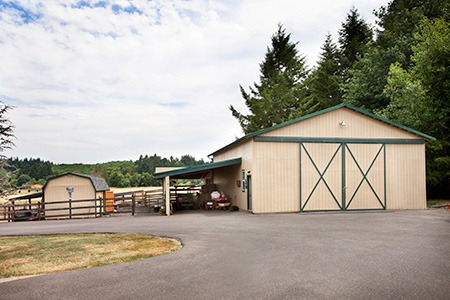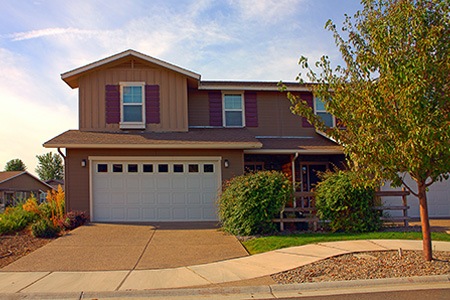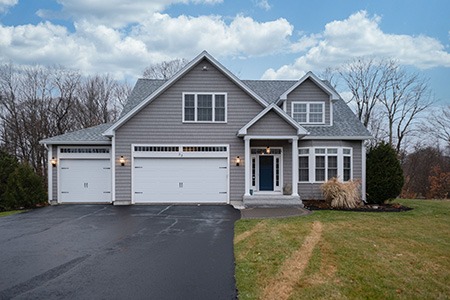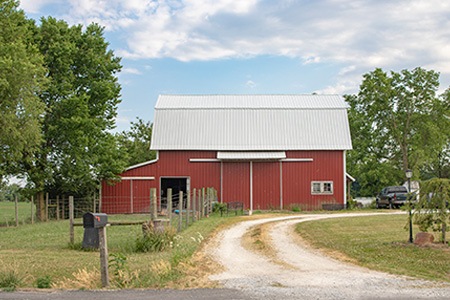How Close Can a Driveway Be to the Property Line?
Author: Rick Worst | Editor: Omar Alonso
Review & Research: Jen Worst & Chris Miller

Are you building a new home? Are you interested in buying a property? Understanding property lines is part of homeownership. Encroaching your neighbor's property can lead to legal issues and lawsuits, leaving you with an expensive renovation to rectify the situation. How close can a driveway be to the property line?
When the property is first approved for construction, it undergoes a survey clearly defining the property lines. If you want to build a driveway on your land, you might assume you can lay it right against the property line. After all, it's your property, and you can do what you want, right?
Unfortunately, that's not the case. All cities have guidelines on how close you can build to the property line, and most don't appreciate it when you build the driveway right against it. Always check with your local council and your area's regulations before starting the project.
How Close Can a Driveway Be to the Property Line?
Several factors determine how close you can build to the property line. Local building codes, the location of the driveway, and what you want to develop all apply to the project. So, how far must the setback be for your new driveway? According to most local regulations, it must be five feet from the property line, which is the same for what is considered blocking a driveway.
Some areas allow you to build right up against the boundary but check with the council before starting your planning. This also goes for your parking space dimensions, too. You can't creep them closer just because they're meant for stationary parking. Driveways usually have lax restrictions on how close you can build to the property line compared to standing structures like garages.
What Do I Do if My Neighbor Builds Their Driveway on My Property?

If you or your neighbor build any types of driveway slightly over the property line, it's called "encroaching" on the other person's property. This means the neighbor's driveway is not on but over the property line. If they build on the property line, they may miscalculate the distance and end up encroaching on your property with the project.
So, verifying the exact property line before starting a driveway project is important. Even if you're only an inch over the property line, it still counts as encroachment. If you encroach, your neighbor might decide to start litigation proceedings against you. If they get a favorable ruling, you'll have to dig up the offending area of the driveway, leading to a costly renovation.
However, it depends on how seriously your neighbor takes the encroachment. Sometimes, they might not care and never talk to you about it. Still, it's worth talking to your neighbor before starting the project to get a clear indication of where they view their property line and your project plans.
If they do have a problem with your driveway encroaching on their property, you could be in for a big dispute that ruins your relationship with your neighbor. Living next to someone with a problem with you isn't a good way to kick off your time in your new home. Encroachment is a serious offense; if it goes to litigation, you'll lose if you're on the wrong side of the line.
Check the Local Rules on Property Lines

If you're unsure of where the property line is, getting a professional land survey before you start your planning is a good idea. They can also likely answer how close can a driveway be to the property line. A professional land survey shows you exactly where the property line is and where you can build, taking the risk of encroachment out of the situation.
When you start your planning, contact the zoning board in your area. Most zoning boards won't have any rules for recommended setback limits for the driveway. However, it pays to clearly indicate the property line and any setback recommendations before you start planning and building it, and then discovering a guideline for a driveway setback from the property line is too late.
If you hire a professional land surveyor to assess your property lines before you start your planning process, you revive the responsibility from yourself, mitigating the risk of encroachment. The land surveyor looks up the zoning rules in your area, giving you recommendations on the proper setback guidelines, if there are any.
Other than encroachment, there are other factors to consider when building the driveway. If you're building the driveway near an area accessed by emergency vehicles, you might get in the way of their access, resulting in an issue.
Doing a land survey ahead of your project planning with a reputable and experienced land surveyor makes for a smooth planning process and no unexpected hiccups after finishing the build. And how close can a driveway be to the property line, five feet usually so this makes all of your planning a bit easier.
What Are the Common Causes of Property Line Disputes With Driveways?

So, what are the reasons that might cause a dispute with your neighbor over property lines and possible encroachment? One of the most common issues is building a driveway between shared properties. For instance, if two homes share access to a driveway, it may cause disputes between the homeowners on who is responsible for maintaining it.
Also, if one homeowner wants to carry out work on the driveway, they'll require the neighbor's permission before implementing any changes to it. Failing to get permission before starting the work might result in a costly legal dispute between the parties.
In some situations, the driveway might fall within the property line, but the neighbors might have a legal ruling allowing them to access the property. As a result, misunderstandings might require clarification by inspecting the property deeds to establish boundaries.
Dealing with a Driveway Property Line Dispute
If the neighbors can't come to a reasonable arrangement on a property line dispute, the issue can wind up in court, resulting in a costly legal battle between parties. To avoid this situation, the neighbors should consult with each other and reach a resolution on the matter quickly.
It might turn out that the neighbor was unaware of the situation's specifics and came to an amicable agreement on the dispute. In some instances, it might benefit the homeowner to detail the title deeds' specifics and include covenants within the deeds.
If attempts to resolve the dispute don't work out, the homeowner will have to contract the services of a land surveyor to get a professional opinion on the matter. The surveyor draws up a plan detailing the issue and submits it to the Land Registry, which is maintained on a county basis in the USA.
After establishing the property lines, the homeowners might be able to resolve the problem without hiring the services of a mediator. If this strategy isn't possible, the homeowner must consult the services of a lawyer to review the specifics and validate the strength of the homeowner's claim.
The lawyer attempts to resolve the problem with the neighbor, using a court action as a final resort. If the attorney manages to resolve the dispute without the matter going to court, it's called an "alternative dispute resolution."
How to Fix Exact Boundaries

When you think of property lines, you probably imagine a straight, defined line running from one end of the property to the other, but that's not always the case. In some instances, the property line might have rough lines outlined in the title deeds.
You'll receive the title deeds as part of your conveyancing process, and they're available anytime from the Land Registry office or website. You'll find your title deeds and the neighbors, giving you a chance to review both and resolve any discrepancies.
If the information on the property lines needs to be clarified, you can use other supporting information, such as aerial maps, photos, and property plans. A qualified and experienced land surveyor can use this information to accurately assess the exact property lines.
If the neighbors come to an agreement on the plan, they can sign it off and deliver it to the Land Registry office together with the completed application and payment of the fee.
What Are Shared Driveway Rights?

The owners of a shared driveway are legally obligated to act responsibly and be considerate of the driveway design, ensuring they don't block access to other users. The title deeds will have the exact specifications and terms relating to the shared driveway. They should feature guidelines surrounding maintenance requirements and fair usage.
Typically, all parties who use a section of the shared driveway are the owners. All parties must incur responsibility for the driveway maintenance. In most cases, there's no legal definition or contract defining the maintenance responsibilities of the parties.
It relies on the neighbors agreeing on the specifics involved with the situation and maintenance responsibilities. In many cases, achieving a favorable agreement on both sides isn't possible, and disputes usually arise, especially surrounding the costs of maintenance and repairs to the shared driveway.
What if a Mediator Can't Resolve a Dispute Over Property Lines?
If the land surveyor draws up the property lines and the homeowner hires a mediator to resolve the dispute, the parties may still be at loggerheads. As a result, the next step is for one of the parties to take the other to court to get a ruling on the matter.
Court battles surrounding property lines and encroachment can be costly legal affairs. Costs can escalate quickly and be more than the value of the disputed land.
So, How Close Can a Driveway Be to the Property Line?
Most local regulations agree upon driveway setback requirements, though there are varying sets of rules depending on where you live, so you should always check. But in general, how close can a driveway be to the property line? In most cases, the answer is five feet.



